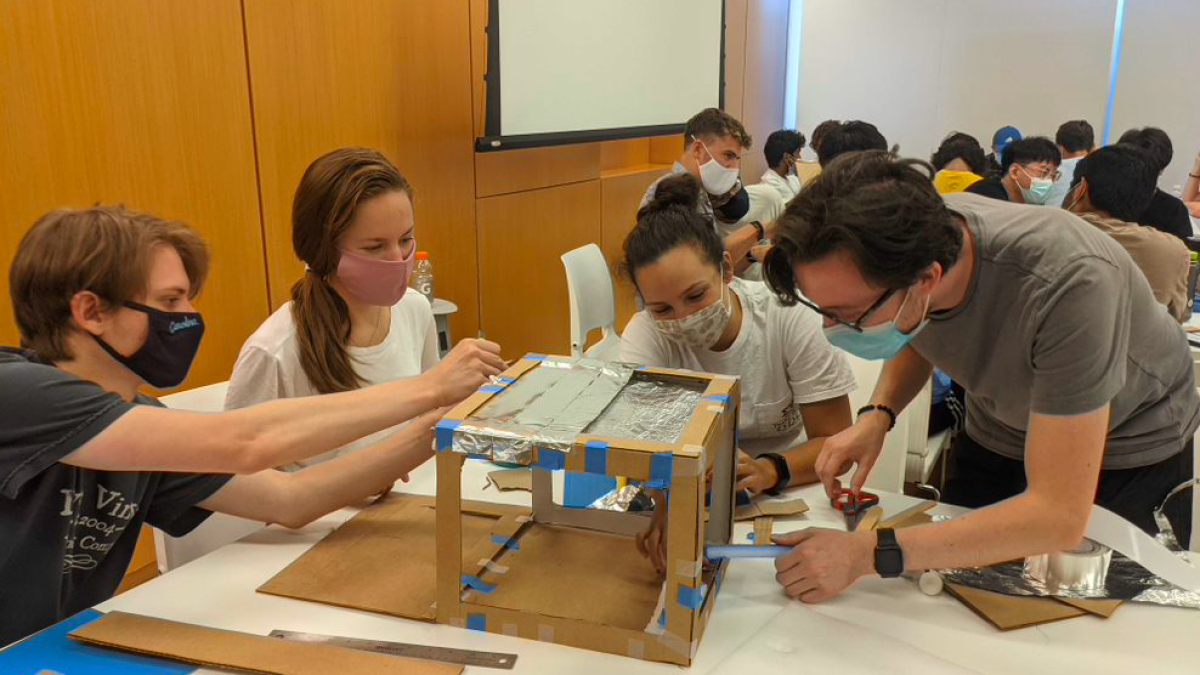New minor teaches major skills in engineering, entrepreneurship
Carolina’s applied sciences and engineering minor equips students with an entrepreneurial mindset and the engineering skills to thrive in both industry and graduate school.

In the fall of 2020, the department of applied physical sciences in the College of Arts & Sciences launched its new applied sciences and engineering (APSE) minor. At that time, students were navigating academic and personal uncertainties stemming from the spring’s COVID-19 outbreak. Would in-person classes be possible? Would everything go remote? How might their learning and research move forward? Fast-forward two years, and the inaugural class of APSE students have now graduated with greater certainty about the future – and an abundance of confidence in the engineering and entrepreneurial skills they’re now using to pursue new academic paths and make an immediate impact in the workforce.
The APSE minor helps engineering-oriented students build on the foundations of math and science, while engaging them to find hands-on solutions to tangible challenges.
“Real-world problems are often interdisciplinary, and we want the APSE minor to develop an entrepreneurial mindset that bridges many disciplines – in both STEM fields and non-STEM fields,” says Richard Goldberg, Ph.D., teaching associate professor and director of undergraduate studies in the applied physical sciences department. “Understanding the economic impact, the social impact and the ethics involved helps our students offer impactful solutions to real-world challenges.”
Learn skills for the workplace
Students enrolled in the minor learn practical skills that allow them to be a prolific influence in the workforce or in other pursuits, such as graduate school. Communication, collaboration and adaptability are infused within the coursework as part of their education and training.
“I absolutely loved every part of APPL 110 (introduction to design and making course) and APPL 285 (fluid mechanics course), all the time I spent in the BeAM makerspaces, collaborating on group projects, and finding time to dive into different labs and research opportunities,” says Nikhil Vytla, a recent Carolina graduate and now a machine learning infrastructure engineer with TruEra, a company that provides quality management solutions driven by artificial intelligence. “I had the opportunity to collaborate with the exercise and sports sciences department to build health-tech for gait retraining in order to mitigate chronic ankle instability. This involved designing, prototyping and building a 3D-printed enclosure that would attach to a shoe, monitor foot pressure via a force sensitive resistor, and send regular vibration to attempt to retrain the position of a person’s foot.”
“Through the APSE minor, students learn important skills for the workplace,” says Goldberg. “They learn how to use important software tools, including tools in the BeAM makerspaces on campus, while gaining exposure to a variety of resources and activities that will help them in their future careers.”
Engineering electives expand learning experience
Through the APSE minor, students select engineering-related electives that complement their majors. Electives draw from a variety of departments, including applied physical sciences, biology, chemistry, computer science, environmental sciences and engineering, marine sciences, mathematics, psychology and neurosciences, and physics and astronomy.
“I was able to collaborate with the fluids lab to learn about Kárman vortices and devise novel ways to harness them for biomedical purposes, and model their development,” adds Vytla. “If you had asked me to do the same things two years ago, I don’t think I would have known where to start. I can confidently say that the APSE minor provides unique, accessible, hands-on design and engineering experiences that have shaped and benefitted my career path.”
Offering students a variety of engineering-focused electives helps them understand how to use engineering, design and modeling approaches, and these skills can give students an advantage if they want to pursue graduate school.
“I truly believe the applied science minor played a large part in my acceptance to graduate school as well as solidifying my decision to go into biomedical engineering and applied sciences,” says Avery Twyman, a recent Carolina graduate and now a graduate student in biomedical engineering at Washington University at St. Louis.
Develop an entrepreneurial mindset
The APSE minor supports the University’s core focus on innovation and reflects the excellence of Carolina’s entrepreneurship education, which ranked ninth in U.S. News and World Report’s 2022 Best Colleges rankings. Coursework within the minor teaches students how to demonstrate curiosity about the world around them, make connections to integrate knowledge, and identify unexpected opportunities to create value. These lifelong skills train students to think and work like entrepreneurs.
“We teach our students that an entrepreneurial mindset is not just about starting companies – it’s broader than that,” says Goldberg. “It’s about giving students the skills they need to think out-of-the-box, to be more curious about the world around them, and to learn how to make connections and integrate knowledge into day-to-day challenges.”
To develop this mindset, students participate in project-based learning and discover how to engage with technical content to make a tangible impact beyond the classroom. The minor consists of a set of five courses in categories that include Introduction to Engineering, Engineering Fundamentals and Engineering Topics. The minor also requires a set of prerequisite courses that are common to most majors in the sciences.
“The professors go above and beyond in caring for their students,” adds Twyman. “They are clearly passionate about what they are teaching, which means more than one may think when it comes to what a student takes away from a course.”
The APSE minor is administered by the department of applied physical sciences. For more information, visit aps.unc.edu/apse-minor.




